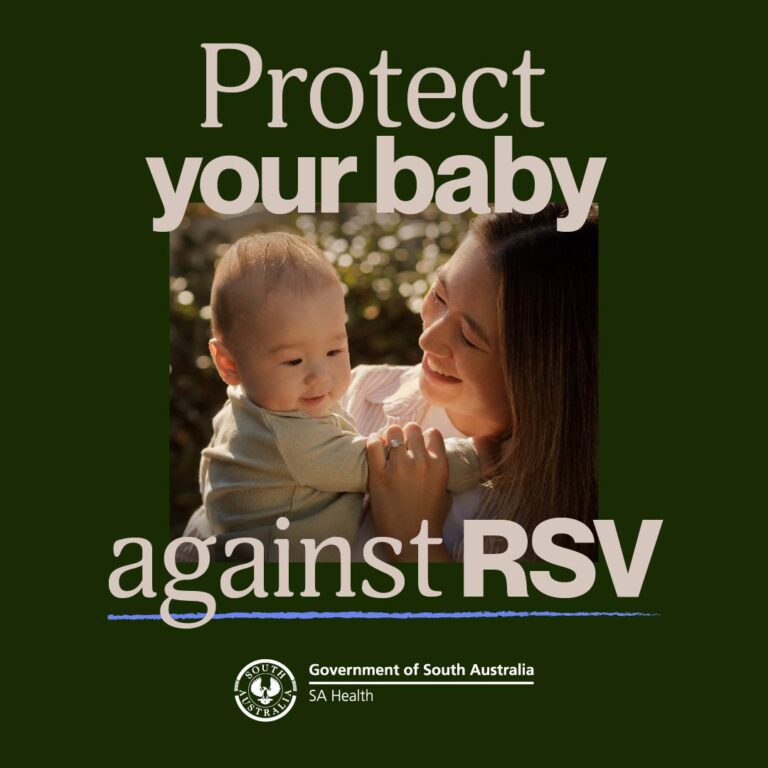New, free maternal and infant immunisations are available to protect babies against RSV.
Respiratory Syncytial Virus (RSV) is a highly contagious virus that causes cold-like symptoms and can lead to serious lung infections. RSV is one of the most common reasons babies and young children are admitted to hospital.
The Australian Government and SA Health are partnering to deliver a new RSV Maternal and Infant Protection Program, offering safe and effective RSV immunisation in 2025.
As RSV case numbers increase in winter, it’s important to get immunised and protect your baby against RSV as early as possible.
What is RSV?
RSV is a common respiratory virus that can cause respiratory infections in people of all ages. While RSV symptoms are usually mild, some young children and infants can become very sick and need hospital treatment. RSV is particularly serious for babies less than 6 months old and children less than 2 years old with underlying medical conditions like lung or heart disease.
In Australia, RSV is the leading cause of infant hospitalisation, with around 12,000 babies admitted to hospital each winter. It is one of the leading causes of children going to hospital, even those who are usually healthy. RSV infection is also the most common cause of bronchiolitis (inflammation of the small air passages in the lungs) and pneumonia (inflammation of the lung tissue) among infants under one year of age.
When do RSV infections peak?
RSV infections typically peak in winter. In South Australia, the RSV season usually occurs from early April to the end of September. During peak times, around 700 cases are reported to SA Health each week.
Almost all children experience at least one RSV infection within their first two years of life.
How does RSV spread?
RSV spreads through droplets in the air when an infected person talks, coughs, or sneezes. The droplets in the air may be breathed in by those nearby. Infection may also be spread by contact with hands, tissues, and on other surfaces, like toys, making it easy for children to catch and pass it on.
What are the signs and symptoms of RSV?
For most people, RSV causes mild symptoms which clear up within about 10 days but some groups of people may develop more serious symptoms.
Mild symptoms include:
• Fever
• Runny nose or nasal congestion
• Sore throat
• Cough
• Ear infections.
In babies under six months, symptoms can be more severe and include:
• Wheezing
• Difficulty breathing
• Irritability
• Poor feeding.
The first time infants and children under 2 years catch RSV, symptoms are generally more severe than later infections at older ages.
When should I seek medical help?
Seek urgent medical attention if your baby has trouble breathing or shows serious symptoms.
- Call healthdirect on 1800 022 222 to speak with a Registered Nurse 24/7.
- In an emergency, call Triple Zero (000) or go to the nearest emergency department.
How is RSV treated?
There is no treatment or antiviral medication for RSV. Antibiotics do not help, as RSV is caused by a virus. Hospitalisation may be required for babies with serious symptoms.
How can I reduce the risk of RSV?
Prevention is key, especially for infants. You can reduce the risk of RSV by:
• Practising good hygiene: wash hands often, cover coughs, avoid sharing cups or toys.
• Staying home when unwell to avoid spreading germs.
• Keeping sick visitors or siblings away from your baby.
• Covering coughs and sneezes with tissues or your arm.
• Disposing of used tissues immediately and washing hands afterwards.
• Getting immunised against RSV.
Free RSV Immunisations
Free RSV immunisations are now available in 2025 under national and state-funded programs.
For the best protection for the baby from birth, RSV vaccination is recommended in pregnancy from 28 weeks. Research has shown that getting vaccinated from 28 weeks of pregnancy reduces the risk of severe illness from RSV in babies younger than 6 months of age by about 70%.
The infant RSV immunisation is recommended and now available for babies whose mother wasn’t able to receive the maternal RSV vaccine at the recommended time and for some infants under 2 years old, who are at increased risk of severe RSV infection.
It’s safe to receive the RSV vaccine at the same time as other vaccines in pregnancy and for babies to receive the RSV immunisation at the same time as other childhood vaccines.
Talk to your GP or usual immunisation provider about your eligibility and to book an appointment.
READ MORE ABOUT IMMUNISATIONS DURING PREGNANCY HERE
CLICK HERE TO FIND OUT MORE ABOUT FREE RSV IMMUNISATIONS IN SOUTH AUSTRALIA
At Play & Go Adelaide we make every effort to provide accurate information to the best of our knowledge at the time of publication. We recommend confirming times, dates and details directly before making any plans as details may be subject to change.
Image Source: supplied
SUBSCRIBE
Follow Play & Go on Facebook and Instagram
Want to get all the latest events and activities straight to your inbox?
Subscribe to our weekly email newsletter below to keep up to date with our latest posts and find out all the best events & activities for Adelaide families. Newsletters are only sent once a week, and you may sometimes get a special offer exclusively for our subscribers only!




